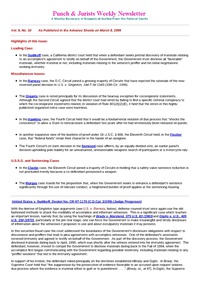With the demise of Singleton-type arguments, defense counsel must once again use the old-fashioned methods to attack the credibility of accomplice and informant witnesses. This is a significant case which teaches an important lesson, namely that, by using the teachings of Brady v. Maryland, 373 U.S. 83 (1963) and …
Among several Federal Rules of Evidence issues discussed in this decision, the court reviewed at length the residual exception rule contained in Rule 807 (which was formerly known as Rule 803(24) until December 1, 1997).
At a preliminary hearing, the defendant requested that the confession of one witness …
Here the Court emphasized that its long-standing presumption against the admissibility of expert testimony on eyewitness identifications stemmed from its concerns about whether such expert testimony would actually assist the trier of fact, rather than concerns about the reliablity of such testimony. In its decision, the Court also identified …
In this case the Eleventh Circuit addressed the question of whether a defendant can be precluded from receiving a "safety valve" sentence reduction under U.S.S.G. § 5C1.2 based on co-conspirator liability. The facts established that a co-conspirator of the defendant had stashed a gun in a marijuana "grow house", …
The Court stated: "Rule 8(c) of the Rules Governing Section 2255 Proceedings, 28 U.S.C. foll. § 2255, provides that "[i]f an evidentiary hearing is required, the judge shall appoint counsel for a movant who qualifies for the appointment of counsel under 18 U.S.C. § 3006A(g) ...." [FN2] The Advisory …
Taking strong issue with a district court's ruling in U.S. v. LaHue, 998 F.Supp. 1182 (D.Kan. 1998) (see the July 20, 1998 issue of P&J), the Eleventh Circuit held that Medicare funds received indirectly by a county health authority are "benefits" within the meaning of the Federal program fraud …
This appeal, which involved the conviction of a high-profile organized crime leader, principally through the testimony of six former members of the Mafia who had become cooperating witnesses, is noted for two issues. First, the Court briefly addressed a Confrontation Clause challenge to the use of closed-circuit television testimony …
Here the Eleventh Circuit held that evidence of the defendant's buyer-seller relationship with an unnamed source was insufficient to establish the existence of a conspiracy.
Citing U.S. v. Townsend, 924 F.2d 1385, 1394 (7th Cir. 1991), the Court stated: "The buy-sell transaction is simply not probative of an …
In this case, two defendants were convicted of robbing a bank. At sentencing the district court enhanced their sentences by two levels under U.S.S.G. § 3B1.4 for using a minor to assist in the crime. That section prescribes a two level enhancement where "the defendant used or attempted to …
While the full court voted not to rehear en banc its previous decision reported at 154 F.3d 1082, Judge Kozinski ripped into the judges who wrote that decision, accusing them of being disrespectful to Congress for criticizing mandatory minimum laws.
This decision must be read in conjunction with the Court's order dated January 8, 1999, reported at 164 F.3d 1210, which was reviewed in the February 22, 1999 issue of P&J where we wrote:
The Court’s Order in this case was only four sentences long. The Ninth Circuit summarily …
This appeal, which involved the conviction of a high-profile organized crime leader, principally through the testimony of six former members of the Mafia who had become cooperating witnesses, is noted for two issues. First, the Court briefly addressed a Confrontation Clause challenge to the use of closed-circuit television testimony …
The Court held: "We find that Sanders [U.S. v. Sanders, 162 F.3d 396] is controlling in the present case. Like Sanders, McDonald entered a pawn shop unarmed, stole firearms along with other items, and was captured shortly thereafter prior to perpetrating any subsequent felonies. There was no lapse of …
In this case, the D.C. Circuit joined a number of other Circuits in rejecting the rationale of a panel's decision in U.S. v. Singleton, 144 F.3d 1343 (10th Cir. 1998) (see the June 22, 1998 issue of P&J), which held that a Federal prosecutor's grant of leniency to an …
The Court reasoned that since the restriction neither involves a "suspect class" nor infringes upon a fundamental interest, it is subject to the "rational basis" test. The Court also concluded that IFP status is a privilege, not a right.
Here the 9th Circuit held that the "three strikes" …
The defendants in this case were convicted of various drug trafficking crimes; and their suggested sentences under the Guidelines were already severe. The Government, however, wanted more; and so it asked the Court to put the defendants away for life based on their alleged responsibility for a double murder. …
Here the en banc Court affirmed an earlier decision reported at 143 F.3d 843, finding police liability under 42 U.S.C. §1983 for unwarranted, unreasonable weapons searches of participants in a motorcycle rally.
The Fourth Circuit, in this en banc decision, affirmed an earlier panel decision, reported at 143 …
Here the Court held that a parolee's interest in his continued liberty "crystalized" during his two years of successful parole, thus requiring strict scrutiny of the state's actions and defeating the state's claim that he had been released in error.
This case is noted for its discussion of …
